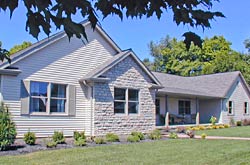Modular homes vs. mobile homes? What's the difference! A LOT!
That question is asked hundreds of times in West Virginia by bankers, realtors, zoning officials and the general home buying public. There is a clear difference in the two. The term “mobile home” has been replaced in technical and legal jargon by the term “manufactured housing” in recent years. To further confuse the issue modular homes often are referred to as off site built, pre-fabricated, industrialized, systems built, as well as other terminology that has been used in various situations.
MANUFACTURED HOMES
 In general manufactured homes (formerly mobile homes) are built to comply with a code developed in 1976 referred to as the HUD Code. This code requires that any home built to comply must be attached to a permanent chassis---a steel frame. In general, due to this steel chassis, the structural elements required differ from those required for modular or conventional construction. (For example 2x6 floor joists can be used versus 2x10 floor joists in modular or conventional home construction.)
In general manufactured homes (formerly mobile homes) are built to comply with a code developed in 1976 referred to as the HUD Code. This code requires that any home built to comply must be attached to a permanent chassis---a steel frame. In general, due to this steel chassis, the structural elements required differ from those required for modular or conventional construction. (For example 2x6 floor joists can be used versus 2x10 floor joists in modular or conventional home construction.)
MODULAR HOMES
 Modular homes must meet all West Virginia and local code requirements as opposed to a HUD code that would supersede any state or local code requirements. Modular homes must comply with the same building codes as required for any conventionally built home in West Virginia. Most states have adopted a version of the International Residential Code therefore requiring that the modular homes delivered to that state must comply with their individual versions of the IRC (International Residential Code).
Modular homes must meet all West Virginia and local code requirements as opposed to a HUD code that would supersede any state or local code requirements. Modular homes must comply with the same building codes as required for any conventionally built home in West Virginia. Most states have adopted a version of the International Residential Code therefore requiring that the modular homes delivered to that state must comply with their individual versions of the IRC (International Residential Code).
In short, modular homes must comply with the same codes and specifications as any site built or conventionally built home in West Virginia.
Due to the fact that modular homes are built to the same code as site built homes there is no difference in financing, insuring or appraising a modular home. Manufactured homes (HUD Code) are treated in a uniquely different manner due to their compliance to a less stringent code.